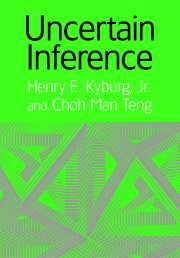Book contents
- Frontmatter
- Contents
- Preface
- 1 Historical Background
- 2 First Order Logic
- 3 The Probability Calculus
- 4 Interpretations of Probability
- 5 Nonstandard Measures of Support
- 6 Nonmonotonic Reasoning
- 7 Theory Replacement
- 8 Statistical Inference
- 9 Evidential Probability
- 10 Semantics
- 11 Applications
- 12 Scientific Inference
- Names Index
- Index
7 - Theory Replacement
Published online by Cambridge University Press: 07 December 2009
- Frontmatter
- Contents
- Preface
- 1 Historical Background
- 2 First Order Logic
- 3 The Probability Calculus
- 4 Interpretations of Probability
- 5 Nonstandard Measures of Support
- 6 Nonmonotonic Reasoning
- 7 Theory Replacement
- 8 Statistical Inference
- 9 Evidential Probability
- 10 Semantics
- 11 Applications
- 12 Scientific Inference
- Names Index
- Index
Summary
Introduction
We form beliefs about the world, from evidence and inferences made from the evidence. Belief, as opposed to knowledge, consists of defeasible information. Belief is what we think is true, and it may or may not be true in the world. On the other hand, knowledge is what we are aware of as true, and it is always true in the world.
We make decisions and act according to our beliefs, yet they are not infallible. The inferences we base our beliefs on can be deductive or uncertain, employing any number of inference mechanisms to arrive at our conclusions, for instance, statistical, nonmonotonic, or analogical. We constantly have to modify our set of beliefs as we encounter new information. A new piece of evidence may complement our current beliefs, in which case we can hold on to our original beliefs in addition to this new evidence. However, because some of our beliefs can be derived from uncertain inference mechanisms, it is inevitable that we will at some point encounter some evidence that contradicts what we currently believe. We need a systematic way of reorganizing our beliefs, to deal with the dynamics of maintaining a reasonable belief set in the face of such changes.
The state of our beliefs can be modeled by a logical theory K, a deductively closed set of formulas. If a formula φ is considered accepted in a belief set, it is included in the corresponding theory K; if it is rejected, its negation ¬φ is in K. In general the theory is incomplete.
- Type
- Chapter
- Information
- Uncertain Inference , pp. 152 - 174Publisher: Cambridge University PressPrint publication year: 2001



